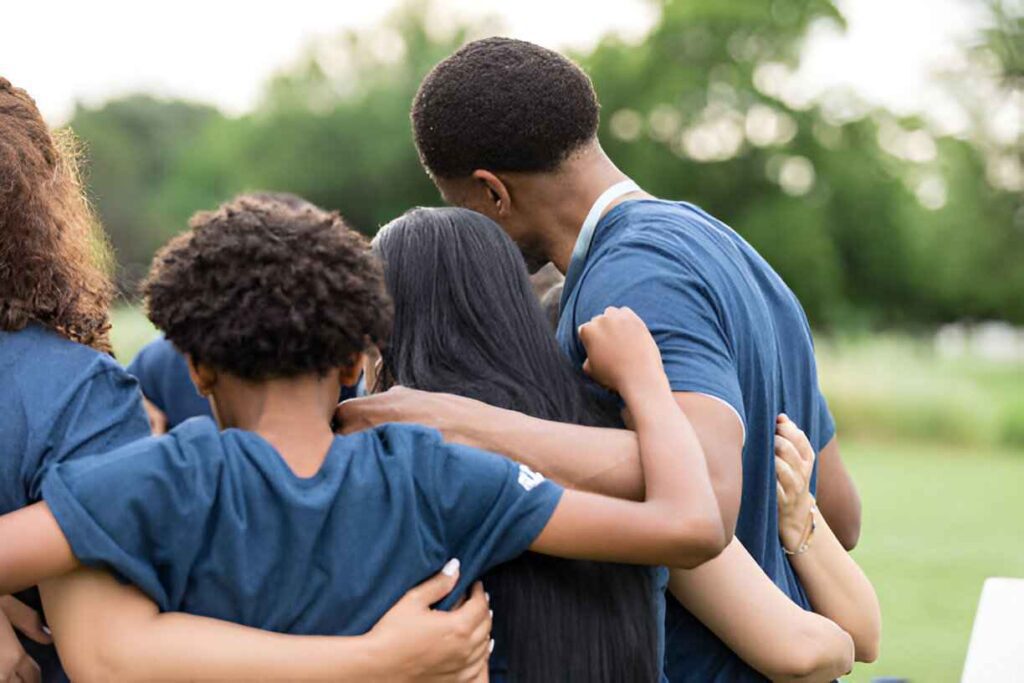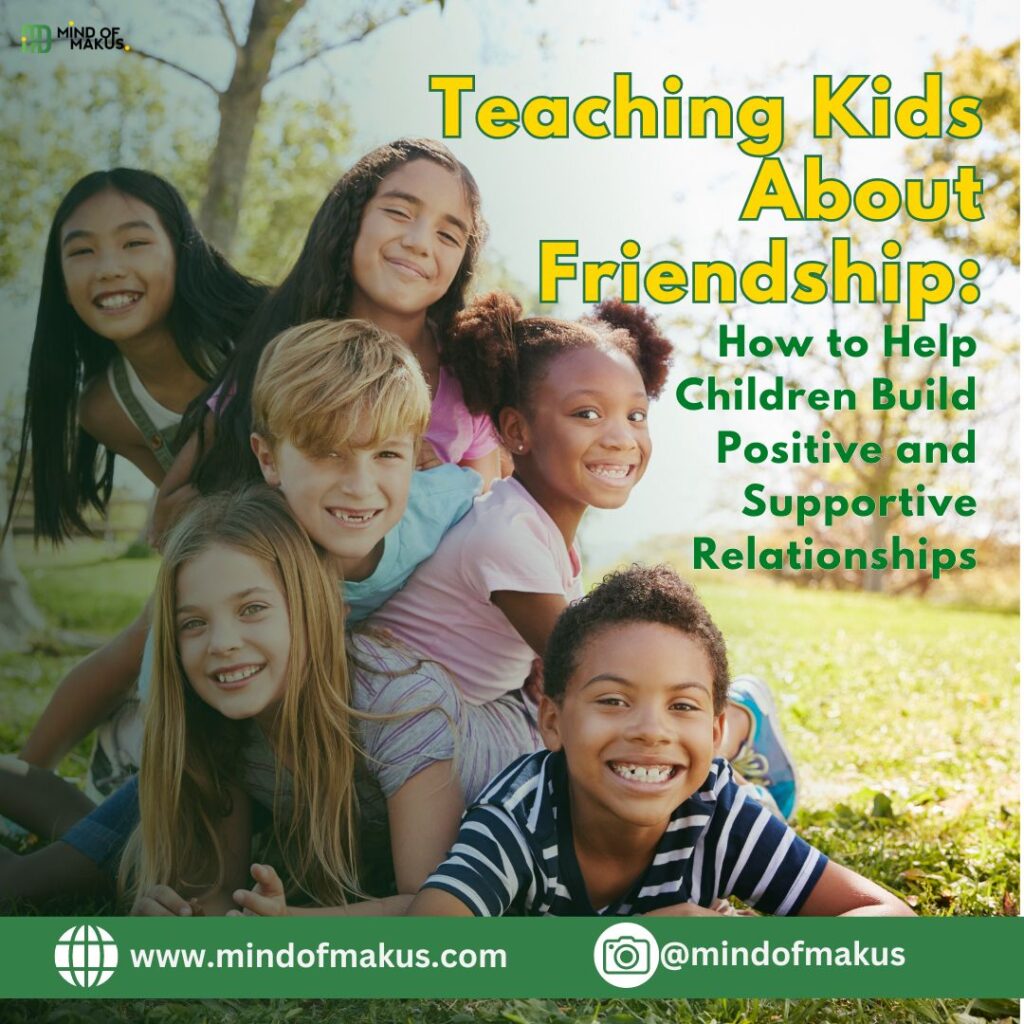Hello, my dear,
How did you get on with speaking to your kids on bullying? Did you try it out?
Kindly leave a comment on how you did it and how they responded.
Friendship is essential to childhood, offering children a space to learn critical life skills such as communication, empathy, and conflict resolution.
As parents, caregivers, or educators, guiding kids in understanding the value of friendship can have a significant impact on their social development and emotional well-being.
As a teenager, I reflect back on all the lessons I learned, having grown up in a small community and then going to boarding school with people from all over the country/world and varying socioeconomic classes. It was indeed an eye-opening peer learning experience.
I realized people had real-life differences in the way they saw and experienced life, and it informed their future greatly.
I had the privilege of having good Christian friends who migrated towards each other and kept our faith through weekly prayers, praise and worship and we even formed a makeshift choir led by Ogecha (she’s a worship minister now). These early exposures meant our foundation was strong.
Can we offer our children the same gift of destiny-ordained friendships?
In this post, we’ll explore the importance of teaching children how to build positive and supportive friendships, along with practical tips for helping them develop the skills needed to create and maintain healthy relationships.
Why Friendship Matters for Children
Friendship offers more than just companionship; it helps children in several ways:
- -Emotional Support: Friends provide a sense of belonging and security, helping children feel understood and supported during difficult times.
- Social Skills Development: Through interactions with peers, kids learn how to communicate effectively, resolve conflicts, and express emotions appropriately.
- Self-Esteem and Confidence: Positive friendships help boost children’s confidence and sense of self-worth, making them more comfortable in social situations.
- Strengthening value systems that have already been taught at home or within communities
By fostering positive relationships, children can grow into emotionally healthy adults who understand the importance of kindness, mutual respect, and healthy boundaries.


Teaching Kids the Value of Friendship
1. Model Positive Relationships
Children learn a lot by observing the adults around them. As a parent or caregiver, you can model healthy friendships by showing respect, kindness, and empathy in your interactions with others.
Demonstrating good communication skills, resolving conflicts amicably, and maintaining healthy boundaries will provide your child with a blueprint for their own friendships.
2. Teach Empathy and Understanding
Helping kids understand empathy is one of the most important foundations of positive relationships. Encourage them to think about how their actions affect others by asking questions like, “How would you feel if that happened to you?”
Role-playing situations can also help kids practice responding to others with kindness and consideration.
3. Encourage Open Communication
Teach your child the importance of communication in friendships. Explain that it’s okay to express their feelings and opinions and that being a good listener is just as important as speaking. Reinforce the idea that open, honest communication helps resolve misunderstandings and build trust between friends.
4. Promote Inclusivity and Kindness
Talk to your child about the importance of being inclusive and kind to others. Explain that being a good friend means accepting differences, respecting boundaries, and including others in activities. Encourage them to stand up for their friends if they see someone being treated unfairly or left out.
5. Discuss Boundaries and Respect
Help your child understand the importance of personal boundaries in friendships. Explain that everyone has the right to feel comfortable and safe in a friendship and that respecting a friend’s boundaries is a key part of being supportive. If your child feels uncomfortable in a friendship, encourage them to express their feelings and seek help if necessary.
Practical Tips for Helping Kids Build Positive Friendships
1. Encourage Playdates and Group Activities
Social interactions are a key part of building friendships, so encourage your child to invite friends over for playdates or participate in group activities.
This not only provides opportunities for kids to bond but also allows them to practice important social skills like sharing, compromising, and resolving conflicts.
Get to know parents with kids in your kid’s age groups, and build relationships with those that align with your values.
2. Teach Conflict Resolution Skills
Conflicts are inevitable in any relationship, including friendships. Teach your child how to handle disagreements respectfully by using “I” statements, such as “I feel upset when you do this,” rather than blaming others.
Explain that it’s okay to disagree, but it’s important to find a solution together and avoid hurtful behavior. Actively teach forgiveness, boundaries and resolution.
3. Help Your Child Understand Different Types of Friendships
Not all friendships are the same, and that’s okay. Teach your child that it’s possible to have close friends, acquaintances, and even friendships that come and go. Helping them understand the fluidity of relationships will prepare them for the natural ebb and flow of social interactions throughout life.
4. Praise Positive Social Behavior
When your child demonstrates kindness, empathy, or good communication with their friends, acknowledge it and offer praise. Positive reinforcement helps reinforce these behaviors and encourages your child to continue building healthy relationships.
5. Create Opportunities for Teamwork
Involve your child in team-based activities like sports, group projects, or family tasks that require collaboration. These experiences help children learn how to work with others, compromise, and celebrate shared success—all crucial elements of a positive friendship.


Helping Kids Navigate Challenges in Friendships
Even in positive friendships, challenges and conflicts are bound to arise. It’s important to equip your child with the tools they need to navigate these situations:
– Teach Assertiveness: Encourage your child to speak up when they feel hurt or uncomfortable in a friendship. Assertiveness helps them protect their boundaries while maintaining respect for others.
– Discuss Healthy vs. Unhealthy Friendships: Help your child recognize the difference between healthy and unhealthy friendships. A healthy friendship is based on mutual respect, trust, and kindness, while an unhealthy one may involve manipulation, exclusion, or emotional harm.
Subscribe to My Newsletter
I and my husband volunteer at a children’s camp every summer and one of my teaching topics last year was healthy friendships, I remember asking them what a good friend does and the 6 year olds sharing their experiences. It was beautiful to see what a child knows about good friends in the playground and the examples their parents have set for them.
– Be There for Guidance: Let your child know they can come to you for advice or help when navigating tough situations with friends. Provide a listening ear without immediately jumping to conclusions or offering solutions. Sometimes, just being heard is enough.
Friendship is a vital part of childhood that plays a key role in a child’s emotional and social development. By teaching your child how to build positive, supportive friendships and helping them develop essential social skills like empathy, communication, and conflict resolution, you are setting them up for a lifetime of healthy relationships.
Remember, friendships are a learning process, and every interaction offers an opportunity to grow.
You can Support My Work
Encourage your child to celebrate the joy of friendship, cherish their connections, and navigate the ups and downs with confidence and compassion.
Until next time, stay authentic,
Stay resilient, and continue to honour your needs.
Live wholeheartedly,
Amaka

